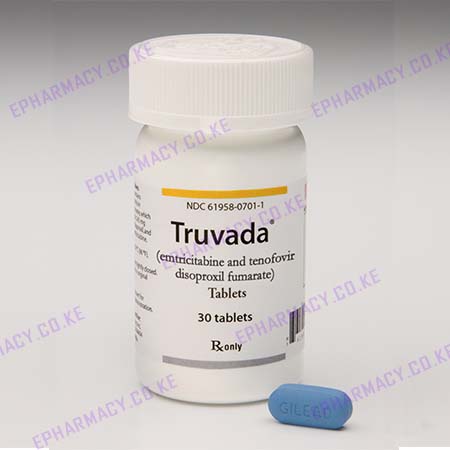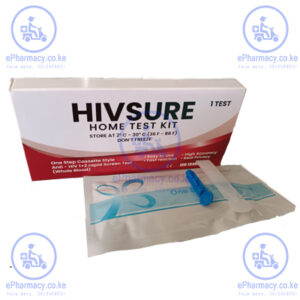Description
What is TRUVADA?
TRUVADA is a prescription ONLY  medicine used in 2 different ways:
- to treat HIV-1 infection in adults and teenagers (12 and older). When used for the treatment of HIV-1 infection, TRUVADA is always used together with other HIV-1 medicines.
- to help reduce the risk of getting HIV-1 infection when used together with safer sex practices. This use is only for adults who are at a high risk of getting HIV-1. This includes HIV-negative men who have sex with men and who are at high risk of getting infected with HIV-1 through sex, and male-female sex partners when one partner has HIV-1 and the other does not.
TRUVADA does not cure HIV-1 infection or AIDS. Ask your healthcare provider if you have questions about how to prevent getting HIV-1 or passing HIV-1 to others. Always practice safer sex and use condoms to lower the chance of sexual contact with body fluids. Never reuse or share needles or other items that have body fluids on them. If you are taking TRUVADA in Kenya with other HIV-1 medicines to treat HIV-1, you must keep taking TRUVADA to control HIV-1 infection and decrease HIV-1 related illnesses.
IMPORTANT SAFETY INFORMATION
What is the most important information I should know about TRUVADA?
TRUVADA can cause serious side effects:
- Too much lactic acid in your blood (lactic acidosis), which is a serious medical emergency. Symptoms of lactic acidosis include weakness or being more tired than usual, unusual muscle pain, being short of breath or fast breathing, nausea, vomiting, stomach-area pain, cold or blue hands and feet, feeling dizzy or lightheaded, and/or fast or abnormal heartbeats.
- Serious liver problems. Your liver may become large and tender, and you may develop fat in your liver. Symptoms of liver problems include your skin or the white part of your eyes turns yellow, dark “tea-colored” urine, light-colored stools, loss of appetite for several days or longer, nausea, and/or stomach-area pain.
- You may be more likely to get lactic acidosis or serious liver problems if you are female, very overweight (obese), or have been taking TRUVADA for a long time. In some cases, these serious conditions have led to death. Call your healthcare provider right away if you have any symptoms of these conditions.
- Worsening of hepatitis B (HBV) infection. If you also have HBV and take TRUVADA, your hepatitis may become worse if you stop taking TRUVADA. Do not stop taking TRUVADA without first talking to your healthcare provider. If your healthcare provider tells you to stop taking TRUVADA, they will need to watch you closely for several months to monitor your health. TRUVADA is not approved for the treatment of HBV.
If your healthcare provider has prescribed TRUVADA to help reduce the risk of getting HIV-1 infection, you should also know:
- You must be HIV-negative before you start taking TRUVADA to reduce the risk of getting HIV-1. You must get tested to make sure that you do not already have HIV-1 infection. Do not take TRUVADA to reduce the risk of getting HIV-1in Kenya unless you are confirmed to be HIV-negative.
- Many HIV-1 tests can miss HIV-1 infection in a person who has recently become infected. If you have flu-like symptoms, you could have recently become infected with HIV-1. Tell your healthcare provider in Kenya if you had a flu-like illness within the last month before starting TRUVADA or at any time while taking TRUVADA. Symptoms of new HIV-1 infection include tiredness, fever, joint or muscle aches, headache, sore throat, vomiting, diarrhea, rash, night sweats, and/or enlarged lymph nodes in the neck or groin.
- Just taking TRUVADA may not keep you from getting HIV-1. You must continue using safer sex practiceswhile you are taking TRUVADA to reduce your risk of getting HIV-1. To further reduce your risk of getting HIV-1:
- Get tested for other sexually transmitted infections. Other infections make it easier for HIV-1 to infect you.
- Get information and support to help reduce risky sexual behavior.
- Have fewer sex partners.
- Do not miss any doses of TRUVADA. Missing doses may increase your risk of getting HIV-1 infection.
- You must stay HIV-negative to keep taking TRUVADA to reduce your risk of getting HIV-1:
- Know your HIV-1 status and the HIV-1 status of your partners.
- Get tested for HIV-1 at least every 3 months or when your healthcare provider tells you.
- If you think you were exposed to HIV-1, tell your healthcare provider right away.
- If you do become HIV-1 positive, you need more medicine than TRUVADA alone to treat HIV-1. TRUVADA itself is not a complete treatment for HIV-1.
- If you have HIV-1 and take only TRUVADA, your HIV-1 may become harder to treat.
Who should not take TRUVADA?
Do not take TRUVADA if you also take:
- Medicines containing emtricitabine or tenofovir disoproxil fumarate (ATRIPLA, COMPLERA, EMTRIVA, STRIBILD, VIREAD).
- Medicines containing lamivudine (Combivir, Epivir, Epivir-HBV, Epzicom, Trizivir).
- Medicines containing adefovir (HEPSERA).
If your healthcare provider has prescribed TRUVADA to help reduce the risk of getting HIV-1 infection, do not take TRUVADA if:
- You already have HIV-1 infection or if you do not know your HIV-1 infection status. If you are HIV-1 positive, you need to take other medicines with TRUVADA to treat HIV-1. TRUVADA itself is not a complete treatment for HIV-1. If you have HIV-1 and take only TRUVADA, your HIV-1 may become harder to treat.
What are the other possible side effects of TRUVADA?
Serious side effects of TRUVADA may also include:
- New or worsening kidney problems, including kidney failure. Your healthcare provider may do blood tests to check your kidneys before and during treatment with TRUVADA. If you develop kidney problems, your healthcare provider may tell you to take TRUVADA less often, or to stop taking TRUVADA.
- Bone problems, including bone pain or bones getting soft or thin, which may lead to fractures. Your healthcare provider may do tests to check your bones.
- Changes in body fat can happen in people taking HIV-1 medicines.
- Changes in your immune system. If you have HIV-1 infection and start taking HIV-1 medicines, your immune system may get stronger and begin to fight infections. This may cause minor symptoms such as fever, but can also lead to serious problems. Tell your healthcare provider if you have any new symptoms after you start taking TRUVADA.
The most common side effects of TRUVADA are:
- In people taking TRUVADA with other HIV-1 medicines to treat HIV-1 infection, common side effects include: diarrhea, nausea, tiredness, headache, dizziness, depression, problems sleeping, abnormal dreams, and rash.
- In people taking TRUVADA to reduce the risk of getting HIV-1 infection, common side effects include: headache, stomach-area (abdomen) pain, and decreased weight.
- Tell your healthcare provider if you have any side effects that bother you or don’t go away.
What should I tell my healthcare provider before taking TRUVADA?
- All your health problems. Be sure to tell your healthcare provider if you have or had any kidney, bone, or liver problems, including hepatitis virus infection.
- If you are pregnant or plan to become pregnant. It is not known if TRUVADA can harm your unborn baby. Tell your healthcare provider if you become pregnant while taking TRUVADA. If you are taking TRUVADA to reduce the risk of getting HIV-1 and you become pregnant, talk to your healthcare provider to decide if you should keep taking TRUVADA.
- If you are breastfeeding (nursing) or plan to breastfeed. Do not breastfeed. HIV-1 can be passed to the baby in breast milk. Also, the medicines in TRUVADA can pass into breast milk, and it is not known if the medicines can harm the baby.
- All the medicines you take, including prescription and over-the-counter medicines, vitamins, and herbal supplements. TRUVADA may interact with other medicines. Keep a list of all your medicines and show it to your healthcare provider and pharmacist when you get a new medicine.
- Your healthcare provider may need to check you more often or change your dose if you take any of these medicines with TRUVADA: didanosine (Videx EC), atazanavir (Reyataz), darunavir (Prezista), or lopinavir with ritonavir (Kaletra).






Reviews
There are no reviews yet.